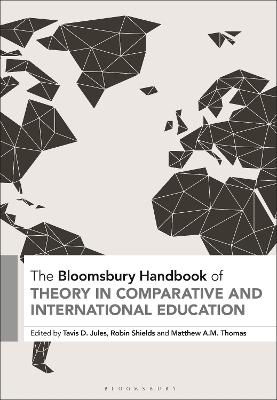
The Bloomsbury Handbook of Theory in Comparative and International Education
Bloomsbury Academic (Verlag)
978-1-350-24512-9 (ISBN)
The handbook includes chapters on a diverse collection of theories, including but not limited to: Structural-functionalism, Colonialism/Imperialism, Marxism, Human Capital Theory, Dependency/World Systems Theory, Post-Colonialism, Post-Socialism, Post-Foundationalism, Neo-liberalism, Neo-Institutionalism, Neo-Marxism, Policy Borrowing and Lending, Peace Theories, Human Rights, Constructivism, Racism, Gender, Queer Theory, Social Network Theory, Capabilities Theory, and Cultural Political Economy.
tavis d. jules is Associate Professor of Cultural and Educational Policy Studies at Loyola University Chicago, USA. He is the author of Educational Transitions in Post-Revolutionary Spaces (Bloomsbury, 2018). Robin Shields is Professor of Education at the University of Bristol. He is the author of Globalization and International Education (Bloomsbury, 2013) and a co-editor of the Comparative Education Review. Matthew A.M. Thomas is Senior Lecturer in Comparative Education and Sociology of Education at the University of Sydney, Australia. He is co-editor of Examining Teach For All (2020).
Acknowledgements
Preface
Notes on Contributors
Introduction: New Directions in Comparative and International Education, tavis jules
SECTION 1: FOUNDATIONAL THEORIES
· Section Introduction
1. Structural-functionalism in Comparative and International Education: Antecedents, developments, and applications – Marcelo Marques
2. Imperialism, Colonialism, and Coloniality in Comparative and International Education: Conquest, Slavery, and Prejudice – Tavis Jules, Syed Amir Shah, and Pravindharan Balakrishnan
3. Marxism in Comparative and International Education: Foundational Political Economy Perspectives on Education – Robin Shields and Kalyan Kumar Kameshwara
4. Human Capital Theory in Comparative and International Education: Development, Application, and Problematics – Donna C. Tonini
5. Dependency Theory and World-Systems Analysis in Comparative and International Education: Critical Accounts of Education and Development – Tom G. Griffiths
SECTION 2: POST-FOUNDATIONAL THEORIES
· Section Introduction
6. Post-colonialism in Comparative and International Education: Interrogating power, epistemologies, and educational practice – Aizuddin Mohamed Anuar, Arzhia Habibi, and Olga Mun
7. Post-modernism and Post-structuralism in Comparative and International Education: Examining background context, application, and prospective – Edith Mukudi Omwami
8. Post-Socialist Transformations in Comparative and International Education: Monuments, Movements, and Metamorphoses – Iveta Silova, Zsuzsa Millei, Ketevan Chachkhiani, Garine Palandjian, and Mariia Vitrukh
9. Gender in Comparative and International Education: Gender as noun, adjective, and verb – Laura Wangsness Willemsen and Payal Shah
10. Post-Foundational Approaches in Comparative and International Education: Uncertain Moves toward Unknown Horizons – Jordan Corson and Susanne Ress
SECTION 3: THEORETICAL ADAPTION AND REVISION
· Section Introduction
11. Neo-liberalism in Comparative and International Education: Theory, Practice, Paradox – Anthony Welch
12. Framing Comparative and International Education Through a Neo-Institutional Lens: The Discourse on Global Patterns and Shared Expectations – Alexander W. Wiseman
13. Neo-realism in Comparative and International Education: Power, Influence, and Priorities – Tavis D. Jules, Syed Amir Shah, Pravindharan Balakrishnan, and Serene Ismail
14. Neo-Gramscian Theory in Comparative and International Education: Power, ideas, and institutions – Tavis D. Jules, Richard Arnol, Pravindharan Balakrishnan, and Victoria Desimoni
15. Regimes and Regionalism in Comparative and International Education: Cooperation and Competition – Marcelo Parreira do Amaral
16. Cultural Political Economy (CPE) in Comparative and International Education: Putting CPE to Work in Studying Globalisation – Susan L. Robertson and Roger Dale
SECTION 4: THEORIES OF POLICY AND PRACTICE
· Section Introduction
17. Constructivism and Learner-Centeredness in Comparative and International Education: Where Theories Meet Practice – Matthew A.M. Thomas and Michele Schweisfurth
18. Differentiation Theory and Externalization in Comparative and International Education: Understanding the Intersections of the global and the local – Marcelo Parreira do Amaral and Marvin Erfurth
19. Policy Borrowing and Lending in Comparative and International Education: A Key Area of Research – Gita Steiner-Khamsi
20. Situating Peace Education Theories, Scholarship, and Practice in Comparative and International Education – Maria Hantzopoulos, Zeena Zakharia, and Brooke Harris Garad
21. Theories of Human Rights Education in Comparative and International Education: From Declarations to New Directions – Monisha Bajaj and Nomsa Mabona
SECTION 5: INTERDISCIPLINARY AND EMERGING APPROACHES
· Section Introduction
22. Theorizing race and racism in Comparative and International Education – Sharon Walker, Arathi Sriprakash, and Leon Tikly
23. Queer Theory in Comparative and International Education: How Queer is CIE – Christian A. Bracho
24. Transitologies in Comparative and International Education: Transformation and Metamorphisms – Tavis D. Jules
25. Actor-Network-Theory and Comparative and International Education: Addressing the complexity of socio material foundations of power in education – Jason Beech and Alejandro Artopoulos
26. Social Network Theory and Analysis in Comparative and International Education: Connecting the Dots for Better Understanding of Education – Oren Pizmony-Levy
27. The Capabilities Approach in Comparative and International Education: A Justice-Enhancing Framework – Joan DeJaeghere and Melanie J. Walker
Index
| Erscheinungsdatum | 08.08.2023 |
|---|---|
| Reihe/Serie | Bloomsbury Handbooks |
| Verlagsort | London |
| Sprache | englisch |
| Maße | 169 x 244 mm |
| Themenwelt | Sozialwissenschaften ► Pädagogik ► Allgemeines / Lexika |
| Sozialwissenschaften ► Pädagogik ► Bildungstheorie | |
| ISBN-10 | 1-350-24512-7 / 1350245127 |
| ISBN-13 | 978-1-350-24512-9 / 9781350245129 |
| Zustand | Neuware |
| Haben Sie eine Frage zum Produkt? |
aus dem Bereich


